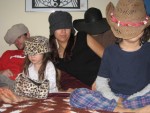- Chemicals are bad. Don’t bring them into your home.
- Children like to help and they should be helping to clean, every day, until a habit is formed.
In my post about encouraging kids to clean, I mentioned that bedroom cleaning is an everyday must, because if you allow kids to let it go for a week, they will become overwhelmed. Faced with the magnitude of the mess, they become paralyzed and unable to begin. And they will give up. You, as a parent, will come back to that room after an hour and it will look exactly the same, and your child will be holed up in the corner, drawing. Your lectures will fall on deaf ears, because the child has already decided that he cannot do this by himself. And really, he can’t.
This is what has happened to our world. People have not done what they are capable of, to pick up after themselves. They became busy, or they found it inconvenient, or they stopped thinking about it, or they just stopped caring. And the mess has grown to the point where the magnitude is overwhelming, and people have given up. They have turned their back on the obvious and are busying themselves with pretty pictures.
They say that there is no proof of global warming. They say that recycling is pointless because recycling trucks and plants pollute too. They say that they didn’t make this mess and it’s not their job to clean it up.
That excuse doesn’t hold water in our house. I don’t care if it’s not fair that everyone has to pitch in and help clean up the aftermath of an afternoon of unbridled three-year-old origami. We all live in this house and we hold a shared responsibility to keep it clean.
No one is going to tell me their mother taught them differently.
Like I’ve said before, it all starts with you. You need to take those first baby steps, make a small decision like using non-toxic cleansers at home.
This in turn allows your kids make a real contribution to the family by chipping in and doing what they are capable of, which boosts their self esteem. They feel that their actions have an impact on their immediate environment. They eventually form lifelong habits of picking up after themselves, and a general aversion to clutter and mess. It becomes natural, a part of their character.
Soon they will be pointing out the litter on your street. And at the park. Maybe you, as a family, will do a little clean-up after going on a hike. Maybe you will start a community clean-up. Learn about your local watershed. Carry canvas grocery bags. Compost. Buy less and recycle more. Look for more and more ways to reduce your ecological impact, and increase your impact on others’ awareness.
This is when it gets exciting. You start getting up on your soapbox. You get loud. You point out changes that could be made at local businesses. You write your congressmen. You send out petitions. You speak at the local school. You start a blog.
Your enthusiasm is infectious. Other people, maybe, make small changes in their own lives. This ripples out to the people whose lives they touch.
I know that some people will never care, and that sucks. They will find you annoying. They will attempt to attach their labels to you, like you are some beast on exhibit at the zoo, something deviant and possibly dangerous. They will dismiss you as a hippie, a treehugger, a bleeding heart, a granola girl, whatever.
Thank them for it, because their labels mean they are taking notice. You have broken through to their consciousness, at least a little bit. Maybe you are making them think.
(Here’s my bleeding heart.)
It’s not enough to preach to the choir. We need to break out of our comfort zone, be willing to look like a zealot. We need to start reaching people that wouldn’t change their habits otherwise. Make them uncomfortable. Make them think.
Maybe they make fun of you to other people. But, maybe those people are more sympathetic. Maybe they can more effectively build on the foundation you have set. The ripple effect is unstoppable and on your side.
We may have already passed the tipping point, environmentally speaking. We can’t wait for lawmakers and nonprofit groups to help us along, tell us what to do. We can’t wait for other people to see the light. We need to act.
“The man who travels alone can start today;
but he who travels with another
must wait until that other is ready.”
-Henry David Thoreau
We need to start today.
- We need to do everything we are capable of in our own lives,
- We need to do more than our fair share to compensate for those people who don’t care,
- We need to talk about it but not complain about it,
- We need to infect people with our enthusiasm,
- We need to inspire others with our actions,
- We need to lead by example.
“You must be the change that you wish to see in the world.”
-Mahatma Gandhi
Now, I don’t feel that I am a leader or that I am inspiring, generally speaking. But I know that I am, to my kids. So I am starting there. Every kid, remember, wants to be helpful and useful; and every adult has one of those kids inside them.
It’s not enough to just preach to the choir, either. We need to remind people that taking care of our earth, our shared home, is a social responsibility. We all live here and we have a shared obligation to keep it livable.
We need to help them remember the lessons and values that their mothers taught them.
And we need to do it today and every day. Until it becomes a habit. A part of our character.
“Do something every day that you don’t want to do;
this is the golden rule for acquiring the habit of doing your duty without pain.”
-Mark Twain
Further reading:
Michael Pollan, author of In Defense of Food: An Eater’s Manifesto, wrote an article titled “Why Bother?” that covers many of the same points I have here, only with more credibility and eloquence, and less hands-on-hips lecturing;
50 Ways to Help the Planet. Yes, another list. Is there anything else you can check off?











Leave a Reply